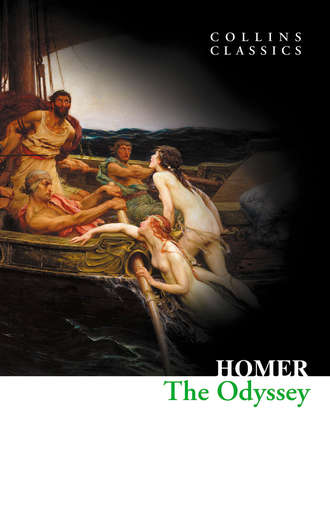
Полная версия
The Odyssey
His news amazed their minds. They had never imagined to themselves that the lad might have gone to Neleus’ city, Pylos: rather that he was somewhere in the estate, with the flocks or perhaps keeping company with the swineherd. So Antinous son of Eupeithes turned to him and demanded: ‘Let me have the whole truth of this. When did he go, and who were the young men who abetted him? Were they chosen Ithacans, or his serfs and house-thralls, of whom he might properly dispose at will? Also answer me this too, categorically, that I may be sure: – did he lift your black ship off you by force, against your will; or did you voluntarily lend her to him because he begged the favour formally?’
Phronius’ son Noemon replied: ‘I gave her to him freely. What could one do when such a man, having a heart-full of worry, asked a kindness? It would be churlish to refuse compliance. The youths who after us are the best men of the country-side formed his crew. The captain, when they went aboard, I recognized for Mentor, or some god his very image: the point has puzzled me, for I saw goodly Mentor here in the city at the dawning of yesterday, when already he had left in the ship for Pylos.’
He finished, and turned away towards his father’s house. The lordly wrath of his two hearers had been kindled. They made the suitors stop their playing and sit in conclave. Then Antinous son of Eupeithes rose to address them. He was deeply moved. His black-bound heart heaved with wild rage and his eyes were flashing fires.
‘Heaven and hell!’ he cried, ‘here’s a fine thing Telemachus has carried through in style to its very end – this journey of his. We used to swear it would come to nought: yet the young fellow has slipped clean away against all our wills like this – just launching out a ship and helping himself to the best company in the place. He threatens ever worse and worse for us: may Zeus cut the strength off from him before he reaches the height of manhood! I ask you to supply me a fast ship and a crew of twenty men, with which to watch and waylay him as he comes through the narrow gut between Ithaca and steep Samos: that this gadding about after his father may cost him dear at last.’ He spoke: they cried applause and urged him to execution. Then they rose up and returned to Odysseus’ house.
Not for very long did Penelope remain unaware of these plots which the suitors were hatching in the evil depths of their minds: for the poursuivant Medon told her what he had overheard of their council, he being just beyond the court-wall while they were thrashing out their schemes within. Medon hasted through the building to bring his news to Penelope who, as he crossed the threshold of her quarters, shrilled at him, ‘Herald, why have the famous suitors sent you in here? Perhaps they now give orders even to the house-maidens of godlike Odysseus, and bid them lay aside their duties and prepare them a feast? May they be dining here to-day for their last and latest time, never again to meet, never to go on wooing! You! who ever swarm to spoil the great wealth, the livelihood of shrewd Telemachus. You! who never heard in days when you were children any word from your fathers of how Odysseus bore himself towards your parents, with never an arbitrary deed nor even an arbitrary word, in the city! Yet such are prerogatives of consecrated kings, who will hate this one and love that – all save Odysseus: for he wrought no iniquity upon any man whatsoever. Indeed your temper and ugly works come out plain in this: nor does any grace survive for past favours.’
Medon’s enlightened mind advised him. He quietly replied, ‘If only that, O Queen, were the worst of our troubles! The suitors discuss an evil deplorably greater; which may Zeus, son of Kronos, forfend: they are fully determined that their sharp swords shall slay Telemachus on his way home: he went to learn news of his father, you see, away to most holy Pylos and sacred Lacedaemon.’
At his speech her knees gave way, and her loving heart: and for long time stupor cut off her power of speech. Her eyes brimmed with tears and the copious fountain of her voice was stopped. After very long, words came to her for a reply: ‘Herald, why has my son gone? He had no call, none whatever, to embark in any one of the swift-going ships which serve men as horses to ride the salt waves: nor to cross the great water. Was he determined that not even his name should survive among men?’
Well-advised again was the saying of Medon: ‘I do not know if a god roused him out: or whether it was that his own great heart rushed him to Pylos upon enquiry as to his father’s return or fate.’ He spoke and turned back through the house of Odysseus: while upon her came down a heart-corroding agony: so that she could not even guide herself to one of the many stools which stood about the house. Instead she sank to the door-sill of her richly-appointed room and wailed aloud in piteous fashion: while round her came crooning all the women-servants of the house, the young ones with the old ones: and across the torrent of her grief Penelope sobbed to them: –
‘Hear me, my people. Now the lord of Olympus has given to me greater pain than has been the lot of all the women born and brought up my mates. Of old had I lost my mighty husband, the lion-hearted, most virtuously endowed of all the Greeks; indeed a noble man whose fame was bruited across Hellas and to the heart of Argos. But now the whirlwinds have snatched my beloved son ignobly from our halls without my hearing he had gone. O cruel women whose hearts knew all, but did not think to call me from my bed when the lad went down to his black hollow ship. If I had known that he was intending the journey, very surely he should have stayed, however eager: or gone only by leaving my dead body behind him in the halls. Hasten, some one of you, and call old Dolius, the bondman my father gave me, even before I entered this house, my gardener who keeps the orchard with its many trees. He shall run to Laertes and sitting by his side shall retail to him all these things. Perhaps Laertes may weave some device in his heart for a public appeal to this people who are coveting the final destruction of his seed and the seed of god-like Odysseus.’
Privileged Eurycleia the nurse answered and said, ‘My lady, I must declare myself, whether you kill me therefor with your pitiless blade or spare me to live on in your service. I knew all his intent, and whatever he bade me I gave him of food and sweet wine. He exacted of me a great oath that I should not tell you before twelve days had passed, unless you yourself missed him and heard that he had left: for he would not that you should mar your lovely flesh with tears. Do you therefore bathe yourself and choose clean clothing for your body: and afterward go to your upper room with your attendant maidens and supplicate Athene, daughter of aegis-bearing Zeus: if haply she may then save Telemachus from death. Increase not the affliction of old afflicted Laertes without cause: for I think the seed of Arceisius his ancestor is not so wholly hateful to the blessed gods that there will not be left some one of the house to enjoy its high-ceiled rooms and the fat lands which stretch hence ever so widely.’
Eurycleia’s words lulled my lady’s weeping, and freed her eyes of tears. She bathed, changed garments, and with her maidens gained the upper floor: and then she put the bruised barley of the heave-offering into its basket and prayed to Athene: –
‘Hear me, unwearied Goddess, child of aegis-bearing Zeus: if ever experienced Odysseus burnt to you in these halls fat thighs of oxen or sheep, then be mindful of them now unto me and save my beloved son: deliver him from the suitors and the excesses of their evil will.’ Her yearning broke in vibrant cry upon the goddess, who heard the supplication: while below stairs in the dusky halls the suitors were rioting, some rude youth now and again making boast, ‘This much-courted queen goes on preparing her marriage with us, never guessing that death is decreed for her son.’ The others took up and repeated the saying – they being the infatuates who did not guess how death had been decreed – till Antinous spoke out and said, ‘Look here, my masters. Now will we cease uttering these words so pleased and proud, lest someone repeat them in the house. Instead let us rise up silently to carry out the scheme arranged which even now met all our fancies.’ Thereupon he chose his twenty leading spirits, who rose up and went to the foreshore and the swift ships, where their first move was to drag down a ship into deep water. They stowed masts and sails into her blackness and refixed round the oars their raw-hide thole-loops, as was due and meet. They strained flat the white sails. The disdainful attendants carried war-harness to them. Then they took her well out to moorings in the road, and came ashore for supper and to wait for the fall of darkness.
All this while circumspect Penelope was lying in her upper room, without eating or even tasting any food or drink, agitated to know if her innocent son would escape death or be overcome by the hands of the intolerant suitors. Her distress was the distress of a lion beset and at bay in a throng of men, seeing with anxious eye how they spread round him in a crafty circle. With just such fears was she wrestling when the swoon of sleep came down on her. She lay back and slept: and all her frame relaxed.
Then the grey-eyed goddess, Athene, provided a fresh resource. She created a phantom, the bodily likeness of another daughter of stout Icarius, Iphthime, who had wedded Eumelus and lived at Pherae. This wraith she sent to the house of godlike Odysseus, to weeping, moaning Penelope, that she might lay aside her lamentation and loud tears. In it came to the wife’s chamber, through the thong-hole of the latch, and took stand there behind her head and said its say to her as follows: ‘Do you sleep, Penelope, with your loving heart so bruised? Not even the Gods resting at ease above our affairs can bear to let you so weep and suffer, forasmuch as there is a homecoming appointed for your son. He is no transgressor against the gods.’
Cautious Penelope murmured back as she slumbered very sweetly in the gate of dreams: ‘Why come now, sister, seeing how rarely you get here from your so-distant home? You tell me to lay aside these many distressful griefs which torture my heart and mind. Why, a time ago I lost my lion-hearted hero husband, whose nobility was noised through Hellas and Argos: and now my beloved boy, a child untempered in affairs or words, has gone in a hollow ship. I sorrow more for him than for my man and tremble in fear of what he may suffer among the strangers he visits or in the wide sea. His many enemies invent snares for him, intending to kill him before he can reach home again.’
The dim wraith replied, ‘Be brave: give not fear too large rule over your heart. There goes with him a guide of power such as all men would pray to have stand by them, even Pallas Athene. She takes mercy upon your grief and directly sends me that I may speak to you these comforts.’
Wise Penelope again said, ‘If you are divine and have heard the voice of a god, enlighten me now upon my unfortunate husband, whether he yet lives and sees the light of day, or is now a dead man in the house of Hades.’
Said the dim shadow: ‘Of that I will not tell you all, not even if he be alive or dead. It were ill to speak airily of that.’ With which words the spectre vanished by the latch, and dissolved into the moving air: but Penelope the daughter of Icarius rose up from her sleep, her loving heart warmed by the vividness of the dream which had fallen on her in the gloaming.
The suitors set forth, harbouring sadden death for Telemachus in their hearts, and sailed the water-ways as far as a stony island in mid-sea, equidistant from Ithaca and craggy Samos, even the islet Asteris, no large place: which has a harbour with two approaches and in it a berth for ships. There they drew up to lie in wait for him.
BOOK 5
Dawn rose from her marriage-bed beside high-born Tithonus to bring her daylight to both gods and men. The immortals, with Zeus the high-thundering, their mightiest one, sat down in council: and to them Athene spoke thus, designing to remind them of the many misfortunes of Odysseus, whose long sojourn in the nymph’s house lay heavy on her heart: –
‘Father Zeus, and you happy ever-living Gods: henceforth let no sceptred king study to be kindly or gentle, or to ensue justice and equity. It profits more to be harsh and unseemly in act. Divine Odysseus was a clement and fatherly king; but no one of the men, his subjects, remembers it of him for good: while fate has abandoned him to languish sorely in Lady Calypso’s island, kept there by her high hand, a prisoner in her house. Nor has he power to regain the land of his fathers, seeing that he lacks galleys and followers to speed him over the broad back of ocean. Moreover, there is now a plot afoot to murder his darling son as he returns from sacred Pylos or noble Lacedaemon, whither he went in hope to hear somewhat of his father.’
Zeus the cloud-marshal answered her and said, ‘My child, too fierce are the judgements of your mouth. Besides, I think this last move was of your scheming, for Odysseus to avenge himself on those men when he comes. You have the knowledge, the power and the skill to convey Telemachus again to his own place wholly unscathed. See that it is so: and that the suitors come back too in their ship, as they went.’
He turned to Hermes, the son he loved, and said, ‘Hermes, hear your commission as our particular messenger. Inform this nymph of the love-locks of my fixed decision that long-suffering Odysseus shall return home as best he can, without furtherance from gods or mortal men. Therefore he is to lash together a raft as firm as may be, on which after twenty days of hazard and disaster he will make rich-glebed Scheria, the Phaeacian land. The Phaeacians, godlike in race and habit, will take him to their heart with all honour as divine: and send him forward to his native place in a ship laden with gifts of copper and gold and clothing of an abundance such as Odysseus would never have amassed for himself in the sack of Troy, even though he had come away intact, and with the full share of booty assigned him by lot. The decree is, that so furnished he shall once again behold his friends and enter his stately house in the country of his fathers.’
Such was the order: and the messenger, the Argus-slayer, made no delay in his obedience. Instantly he laced to his feet the fair sandals of imperishable gold by which he made equal way, swift as a breath of wind, over the ocean and over the waste places of the earth. He took the wand with which at will he could lure the eyes of men to slumber or wake them into activity, and with it in hand the Argus-slayer leaped out upon the air and flew strongly. Over mount Pierus he dived down from the firmament to sea level: and then along the waves he sped like a cormorant which down the dread troughs of the wild sea chases its fish and drenches its close plumage in the salt spume. Just so did Hermes skim the recurring wave-crests.
But when at last he attained that remote island, he quitted the purple sea and went inland as far as the great cave in which lived the nymph of the well-braided hair. He chanced to find her within where a great fire burned on its appointed hearth, perfuming the island far across with the fragrance of flaming cedar-wood logs and straight-grained incense trees. Inside the cavern the nymph’s sweet voice could be heard singing as she went to and fro before her loom, weaving with a golden shuttle. All round the cave-mouth there flourished a luxuriant copse of alder trees and black poplars and richscented cypresses: therein roosted birds of long wing, owls and hawks and chattering hook-billed crows – birds of the sea whose livelihood was from the waters. A young strong vine loaded with bunches of grapes wreathed the opening of the cave. Four springs quite near together jetted out translucent water in separate rills ingeniously contrived, each to water its own garden-plot. The soft lawns were starred with parsley and violets. Even an immortal coming upon the nook would pause before its beauty and feel his heart made glad: the messenger, Argus’ bane, halted in amazement.
When his heart had taken its fill of wondering, he entered the great cave: nor was his figure strange to Calypso, the very goddess, when she saw him come into her presence. (It is a gift to the gods, to know one another when they meet, however distant the home of one of them may chance to lie.) In the cavern he did not find great-hearted Odysseus, who sat weeping on the shore as was his wont, crying out his soul with groaning and griefs and letting flow his tears while he eyed the fruitless sea.
Calypso, the fair goddess, made Hermes seat himself on a splendid polished throne, and asked him, ‘Hermes of the gold rod, ever honoured and welcome, from of old you have had no habit of visiting me: why do you come here to-day? Tell me your mind. My spirit is eager to second your desire if its fulfilment be in my gift and such a thing as may law-fully be fulfilled. Yet first enter further into the cave that I may put before you the meed of guests.’ With such words did the goddess bring forward a table bounteously set with ambrosia. She blended him ruddy nectar. Then did the messenger, Argus’ bane, drink and eat: but when he had dined and made happy his spirit with the food, he opened his mouth and said: –
‘As goddess to god you ask me, you order me, to tell why I have come. Hear the truth of it! Zeus commanded my journey: by no choice of my own did I fare to you across so unspeakable a waste of salt water. Who would willingly come where there is no near city of men to offer sacrifice to the gods and burn us tasty hundreds of oxen? Listen: – in no way can another god add or subtract any tittle from the will of Zeus, the aegis-bearer. He declares that you have with you the unhappiest man of men – less happy than all those who fought for nine years round the citadel of Priam and in the tenth year sacked the city and went homeward. Yet during their return they sinned against Athene, and she worked up against them an evil wind and tall waves by which this man’s entire splendid company were cast away. As for himself, the wind blew him and the sea washed him to this spot. Wherefore now the Father commands that you send him hence with speed: for it is decreed that he is not to die far from his friends. On the contrary he is to behold these friends again and is to sit under his lofty roof in his own land.’ So he said: and as he spoke Calypso the lovely goddess grew cold and shuddered. Then with barbed words did she reply: ‘Cruel are you gods and immoderately jealous of all others; especially do you hate it when goddesses elect to lie openly with men, or fall in love and make a match of it with some mortal. Remember how it was when pink-fingered Dawn chose Orion. You gods at ease in your heaven grudged the union bitterly, even until chaste Artemis of the golden throne killed him in Ortygia by an infliction of her gentle darts. So again it befell when long-tressed Demeter unleashed her passion and coupled herself for love and venery with lasion in the thrice-broken fallows. Not for long was Zeus unaware: and then He slew him with a cast of his blinding thunderbolt.
‘Just in that same way you gods are now envying me this man I live with. Yet it was I who saved him as he clung astride his vessel’s keel, alone and adrift in the wine-dark ocean. Zeus had launched a white thunderbolt at his ship and shattered her: and in her wreck were all the worthy henchmen lost. Only it chanced that he himself drifted to my shore before the wind and waves: and I have loved him and cared for him and promised myself he should not die nor grow old all his days. Yet very justly do you say that no lesser god can overpass or make vain the purpose of aegis-bearing Zeus: accordingly, if the impulse and order are from Him, I must let my man go hence across the sterile sea. Yet shall the sending be in no wise mine. Here are neither oared ships nor crews to convoy him over ocean’s broad back. Unreservedly however will I furnish him my very best advice as to how he may come safe to his native land.’
The messenger, the Slayer of Argus, answered: ‘Of a surety send him away now, in utter obedience and regard for the wrath of Zeus: lest He, being angered against you, later bear malice.’ And after this parting word the mighty Argus Slayer went away: while the nymph set out to find great-hearted Odysseus, in accordance with the command which Zeus had sent. She found him sitting by the water’s edge: his eyes as ever dewed with tears at this ebbing of his precious life in vain lamentations after deliverance – seeing that the nymph no longer pleased his fancy. True, that every night would he sleep with her: he had no choice while he lived in her vaulted cave. Yet was he not willing, and she willed too much: consequently day-long he haunted the rocks and pebble-beaches of the island’s shore, retching up his heart with crying and sighs and misery, his gaze fixed upon the desolate main through a blur of tears.
The goddess approached him and said: ‘Ill-fated man, grieve no longer in this place. Your life shall not so fade away: for see, my mind is most ready to send you hence. Up now and fell yourself tall tree-trunks and carpenter them with metal tools into a great raft, substantial enough to carry an upper deck clear of the water, on which you may journey over the misted sea. I will supply food to guard you against hunger, and water and red wine such as you enjoy: and I will put rich robes on you and ensure a mild wind in your wake that you may come without misadventure to your native place – if so the Gods will: for that company of the wide heavens are more potent than myself, alike in purpose and fulfilment.’
Her speech made steadfast Odysseus shiver. He loudly shot back at her, ‘Surely, Goddess, something not at all to my advantage, something quite contrary, lies behind this your command – that on a raft I launch out over the great soundings of a sea which is so perilous and difficult that not invariably do the tall swift-running ships pass it in safety: not even when Zeus blesses them and makes them happy with his assisting winds. Understand therefore that I shall not embark upon this raft-venture without your will: not unless you as a goddess consent to swear me a great oath that in this you do not plan further misfortunes for my account.’
His words made Calypso, the beautiful nymph, smile. As she soothed him with her hand, repeating his name, she spoke to him as follows: ‘Sharp-witted rogue you are, to imagine and dare say such a thing to me. Bear witness now, Earth, and spacious Heaven overhead, and the river of Styx that slideth downward (which oath is the greatest and most terrible in the use of the blessed gods) how in this counsel I intend no sort of evil against you. Rather am I planning and advising you with the scrupulous care I should have for myself, if ever I stood in such case. Believe me that my understanding is ripe: and the heart in my breast is not made of iron, but very pitiful.’
Having ended, the goddess turned back abruptly. Odysseus followed the divine leader so that they re-entered the cave, immortal and mortal keeping company. There the man sat him down on the throne from which Hermes had lately risen, and the nymph served him a various refreshment of such meat and drink as men usually take. Afterward she took place opposite her great hero, while the maids plied her with nectar and ambrosia. Freely they partook of the cheer at hand till they had had their fill of eating and drinking. Then Calypso the lovely goddess opened her mouth and said: –
‘Kinsman of Zeus and son of Laertes, many-counselled Odysseus: is it your true wish, even yet, to go back to your own country? God forgive you: may you be happy there! Ah, did but the mirror of your mind show you what misfortune must yet fill your cup before you attain the home you seek, verily you would dwell here with me always, keeping my house and your immortality; to the utter rejection of this day-long and every-day yearning which moves you to behold your wife. Think not however that I avow myself her less than rival, either in figure or in parts. It were out and out impious for a mere woman to vie in frame and face with immortals.’









